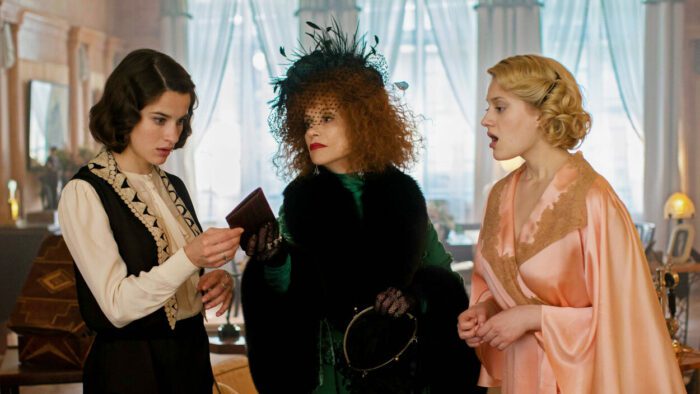At first glance, François Ozon’s new film The Crime Is Mine appears nothing so much as spectacularly quaint. Its performances and characterizations are broad, its dialogue witty, its lighting bright and cinematography richly detailed, its score far from subtle, its plot a well-enough-worn take on the whodunit genre. Set in Paris in the 1930s, it feels like a film from a long ago that never really existed, a bright, snappy, colorful, witty, widescreen comic melodrama, except for the fact that The Crime Is Mine is doing its own entirely unconventional thing, whipping up a frothy French farce full of post-#MeToo feminist fireworks.
The plot is full of false flags and misdirections but begins with a murder. A lascivious theatrical producer is shot dead after a casting-couch call gone wrong (or, depending on your perspective, perhaps right). Espied leaving the scene is aspiring actress Madeleine (Nadia Terezkiewicz), a down-on-her-luck beauty who hasn’t yet gotten her big break. She lives with her best friend Pauline (Rebecca Marder), an unemployed lawyer, in a cramped flat where the two are in arrears to the harsh tune of five months’ rent.
Though she swears her innocence to her best friend, Madeleine hits upon a get-rich-and-famous scheme to which Pauline quickly agrees: she’ll confess to the crime, make her plea to the jury with Pauline as her counsel, serve a short sentence if convicted, and as a consequence become the famous celebrity she believes she truly deserves to be. It may be the kind of harebrained scheme that exists only in the movies—and one that requires not only the willing complicity of a best friend-who-happens-conveniently-to-be-a-similarly-impoverished lawyer but also a local law enforcement who is largely incompetent.

The scheme, to no surprise, works as planned, and Madeleine brings her best acting chops to the jury trial, where she, with Pauline’s help, persuades the court the producer’s murder was simple self-defense. The tabloids run with the story and voila, there you have it: the case’s notoriety brings the pair every bit of celebrity they’d hoped. Offers pour in and the two can celebrate their newfound fame and fortune.
There’s just one problem. In the wake of the trial’s conclusion and the case’s tabloid coverage, another woman appears to confess to the crime. Silent-era film star Odette Chaumette (Isabelle Huppert), an icon of an age Madeleine and Pauline scarcely know, crashes their party to announce, just as Madeleine had months ago, “The crime is mine!” If Odette killed the producer, what was Madeleine’s but a charming ruse? But then again, had it been anything more?
Ozon could not be more clever in wringing winning performances and a heightened, almost dizzying mise en scene from cast and crew. Furthermore, the material—adapted ever-so-loosely from a 1934 play by Georges Berr and Louis Verneuil—lends itself not only to a convincing reenactment of the celebrity-crime-crazy tabloid era but also to postmodern gender politics. Together, the three women—Madeleine, Pauline, and Odette—work together to establish the truth behind the murder and, in the process, more fully realize both their friendships and their ambitions.

In the lead roles, Terezkiewicz and Marder shine. The two are set up as the kind of opposites that so often foster rivalries between female characters: one blonde, one brunette; one emotive, the other intellectual; one performative, the other calculating. But instead, they are, to borrow a more modern parlance, BFFs in the very best sense of the word, forever supporting and believing in each other, their friendship more valuable and cherished than anything else the world can offer. Terezkiewicz is a convincing young star who can and does charm a jury and an audience both. Marder tones down her Radiant Girl ebullience by a few degrees to play the smart and supportive lawyer and best friend. And Isabelle Huppert is still, thankfully, Isabelle Huppert, full of snark and quirk and just enough menace to convince you she might have, like in La Cérémonie decades ago, gone all postal on a lecherous producer.
Along the way there are men, too—lecherous producers, ambitious prosecutors, industrial heirs, debonair architects and the like—yet they’re mere fodder in these woke women’s wake. It may take place in the 1930s, adapt a play from the era, and channel a pastiche of cinematic modes from days gone by, but The Crime is Mine exists to speak to the plight of women today, foregrounding their friendships and wrestling control of the dominant narratives of the day to tell a story that typically goes untold. Suffice it to say, whether a frothy French farce like this is your proverbial cup of tea or not, The Crime is Mine will be gleefully, giddily, and not unmeaningfully unlike anything else at your local cinema this holiday season.
Bon visionnage!



